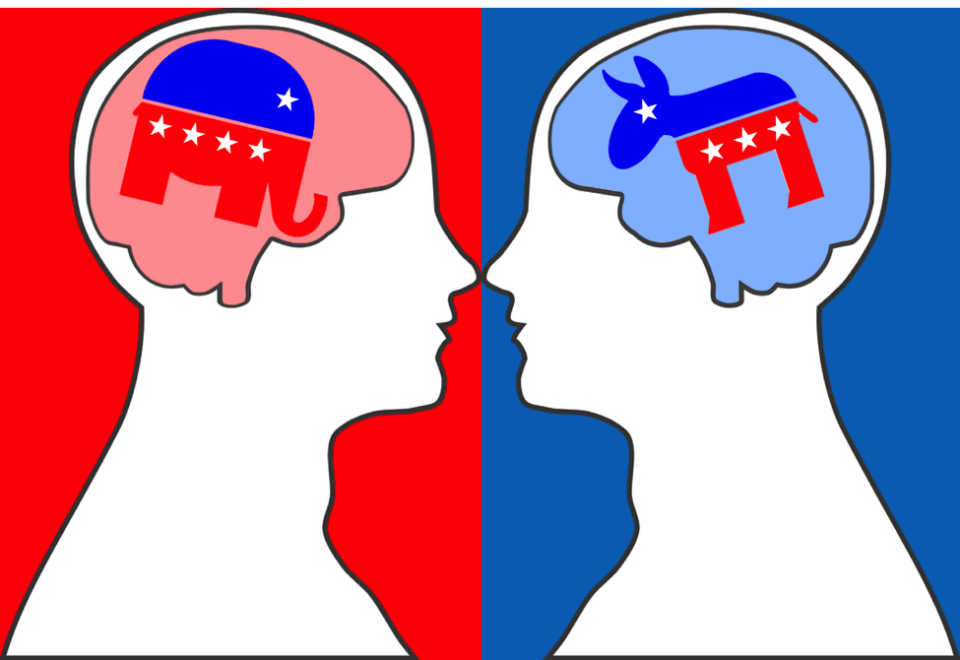“Let your eyes look straight ahead;
fix your gaze directly before you.
Give careful thought to the paths for your feet
and be steadfast in all your ways.
Do not turn to the right or the left;
keep your foot from evil.”
—Proverbs 4:25-27
I’ve been influenced by a great many books over my adult life, but few, if any, have impacted me greater than Jonathan Haidt’s eye-opening book, The Righteous Mind: Why Good People Are Divided By Politics And Religion.
Haidt, a moral psychologist, argues with unsettling persuasion that human beings hold the political opinions we do based not on logical reasoning and a balanced, objective look at the data. Rather, our political opinions are largely instinctive, based on intuitions, hunches, gut feelings, predispositions, and innate prejudices. Only when we are required to prove or defend our political opinions to others do we engage in logical reasoning and research to accomplish that. Often, the reasons we give to others, especially those with a differing opinion, are not the reasons we ourselves came to that belief but rather the reasons we believe others might be persuaded to join us in that belief.
It was only after I’d read Haidt’s explanation of the political mind that political divisions began making sense to me.
The quote from ancient Greek philosopher, Demosthenes, rings true: “Nothing is easier than self-deceit. For what every man wishes, that he also believes to be true.” In other words, we believe what we want to believe — what we are already inclined to believe.
But what determines our political predispositions? What gives us the instincts and inclinations that we have?
The more I observe politics, the more I am persuaded that every contemporary political dispute revolves around culture and identity. If, for some unfortunate reason, an alien from outer space spent hundreds of hours observing American politics and political behavior, that alien would probably conclude that a person is a Democrat or a Republican for much the same reason as one is a “Crip” rather than a “Blood,” or a Dallas Cowboys fan rather than a Washington Redski—er, Football Team fan.
Political partisans have no problem seeing how those on the other side are motivated by their cultural/ethnic/socioeconomic/religious identity, but they can rarely see it in themselves. Conservatives take one look at someone wearing a rainbow “pride” shirt and know that person is a liberal. Liberals take one look at a white man walking into a Southern Baptist church on Sunday and know he’s a conservative. How does one know? Because, intuitively, we understand that politics is fundamentally based on culture and identity.
Cultural conservatives value traditional morals and social structures, which almost always overlap with the interests of the majority (or normative) culture/race/socioeconomic class/religion. Cultural progressives value what they perceive as moral, economic, or political progress, which almost always overlap with the interests of cultural/racial/socioeconomic/religious minorities. And then there’s cultural libertarians, who exhibit a laissez faire or “live and let live” attitude, not just politically but also culturally, socially, morally, and religiously.
Let me give an example. Fox News (which I sometimes call “the unofficial media wing of the GOP”) ceaselessly highlights the crime and violence committed by protesters and rioters in (mostly Democrat-run) cities, while criticizing liberals for enabling and failing to condemn this behavior. Meanwhile, CNN and MSNBC (together, the unofficial media wing of the Democratic Party) highlight unjustified shootings of African Americans by police and vigilantes, while criticizing conservatives for enabling and failing to condemn this behavior.
This is one of dozens of examples of cultural identity immediately sorting people into predetermined, instinct-driven opinions on news events. The truth is often nuanced and complex, requiring one to admit the flaws of multiple groups. But partisans have little interest in nuance or objectivity. They prefer snapping to their preset, culturally determined views and defending their favored societal groups. With conservatives, the instinct is to defend the police and those brave vigilantes who go into the inner cities to “defend the peace.” For liberals, the instinct is to defend minorities and downplay the violence of rioters who share their overarching political opinions.
The coronavirus pandemic (and the responses to it) is another example of cultural differences. Liberals are inclined to trust the suggestions of scientists, even when those scientists sometimes let their political biases show by discouraging social gatherings while taking a lax stance on protests they favor. Conservatives are much more culturally inclined to distrust those they view as universally biased “experts” and tend to snap toward unfounded ideas that contradict theirs. Just look at all the conspiracies about how masks are actually bad for you, how vaccines cause autism, how Barack Obama and Kamala Harris aren’t actually US citizens, etc.
Everyone has a cultural/racial/socioeconomic/religious identity, and thus everyone has a built-in bias. I would argue that, for the sake of the Christian witness, believers should be self-aware of this bias, and we should be capable of resisting our innate inclinations and snap judgments when they conflict with our Christian values and principles.
History is, unfortunately, filled with examples of Christians who let their cultural identity take precedence over their identity in Christ.
Christian conservatives erred when they defended slavery. They erred when they tried to institute various denominations of Christianity as the state religion during the era of the American founding. They erred when they defended segregation. Christian progressives err when they defend gay marriage as not just morally acceptable but also worthy of celebration in the Christian worldview. They err when they instinctively take the side of minorities over others without knowing all the facts or hearing everyone out. They err when they try to use the government to accomplish tasks that are meant for the church.
Having an earthly culture and identity isn’t a bad thing in itself. The importance is in putting one’s identity in Christ first, before and above anything else. When we do this, it becomes easier to let our cultural biases fade into the background. It becomes more natural to see all people in every social group as sinful, self-interested individuals in need of redemption. When we intentionally set out to base our identities in Christ, we should no longer feel like we fit perfectly into the culturally conservative or culturally liberal camps. Those cultures were molded and shaped by faulty, sin-prone humans. They split people into groups of political pawns rather than seeing them as beloved children of God for whom Christ died on the cross.
I am not saying that putting one’s identity in Christ before one’s earthly, cultural identity is easy. Far from it! Little about the Christian walk is easy. But it is necessary to think for ourselves, to display God’s love to all kinds of people, and to live set apart in a broken world.
To quote Peter Kreeft, “Christ cannot be co-opted for any cause; all causes must be co-opted for Him.”



), //libertarianchristians.com/wp-content/plugins/smartquizbuilder/includes/images/template6-latest.jpeg))

), https://libertarianchristians.com/wp-content/plugins/smartquizbuilder/includes/images/template6-latest.jpeg))


;?>/smartquizbuilder/includes/images/sqb-registration-img.jpg)

